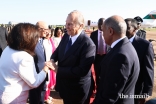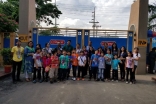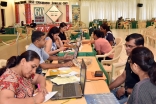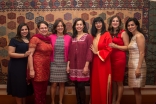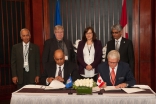Ismaili Centres Archive
8 October 2017 - Mawlana Hazar Imam arrived in Uganda this afternoon for his first Diamond Jubilee visit.
Who doesn’t love biscuits? Adored by the young and old, biscuits make it to every household. However, how many of us know the laborious and lengthy process that goes behind the making of these delicious snacks? On 7th October, young children of the Shia Ismaili Muslim community of Bangladesh were taken to the biscuit factory belonging to the Olympic Industries Limited, a local food products supplier, to show them the practicality of how flour becomes the finished product that they eat.
Why is the prayer space inside the Jamatkhana restricted only to Ismailis during congregational practice times?
Diamond Jubilee performances unite the Southeast Jamat
A Jamatkhana is a designated space for Shia Ismaili Muslims to gather and perform tariqah practices, such as supplicatory prayers - du‘a, meditative sessions of remembrance - zikr, and the recitation of devotional poetry, such as ginans and qasidas.
On Wednesday 18 October, The Ismaili Centre, London hosted its inaugural Diamond Jubilee lecture entitled Mediation: Pluralistic Discourses. Guests were addressed by Dr Christophe Bernasconi, the fourth Secretary-General of the Hague Conference on Private International Law.
Earlier this week, the Ismaili Leaders’ International Forum (LIF) hosted a special event in Paris to celebrate Prince Amyn’s 80th birthday.
In the late 19th century, Mawlana Sultan Muhammad Shah encouraged members of the Indian subcontinent Jamat to consider employment and business opportunities in East Africa.
Many of the early Ismaili settlers in Uganda benefited from the expansion of the railroad as it created an enabling environment for the settlement of families.
By the time Mawlana Hazar Imam came to Uganda on 25 October 1957 for his Takht Nashini, a commemoration of his appointment as the Imam, the Jamat in Uganda was flourishing economically. In addition to retail trade, a handful of Ismailis had acquired land on which they grew and processed coffee, tea, and cotton, mainly for exports to Britain.
With time, there was an establishment of Jamatkhanas, schools, and institutions like Jubilee Insurance and Diamond Trust Bank.
Uganda's Independence took place on 19 October 1962, and Hazar Imam attended the Independence Day ceremonies. The dawn of independence brought with it rapid political and economic change in the country.
In 1989, Mawlana Hazar Imam signed the first official agreement between the Imamat and the Government of Uganda.
Since then, the continuing expansion of the Imamat and AKDN Institutions has fostered improvement in the standard of living in the country. Moreover, today the Jamat is well settled in Uganda and there are 11 Jamatkhanas in the District and two in Kampala.
As the Jamat continues to grow, there are several success stories of both returnees and newly settled Ismailis. Young qualified people are beginning to be attracted by the opportunities in Uganda.
Reiterating the Imamat and AKDN’s commitment to the development of the Ugandan Jamat and to Ugandans, at the opening of the Kampala Serena Hotel on 10 November 2006, Mawlana Hazar Imam said:
“But even as we continue this approach, we must give increasingly rigorous thought to how each local project will affect national development. We must look, in short, for places where our leverage can be greatest. This is why the Kampala Serena Hotel project is so important to us. For - as we look at the countries of East Africa - and at Uganda, in particular - we believe that the travel and leisure sector stands out as one that offers enormous unrealized potential.
AKFED has identified other priorities as well, of course. Basic infrastructure needs are high on our list - as is evidenced in Uganda by both the large Bujagali power development project and the innovative Rural Electrification project in the West Nile region. Another priority is to foster indigenous financial institutions - not only in commercial banking but also in fields such as microcredit, lease finance, micro insurance and other financial products. Flexibility must be a constant watchword in a world which is changing at an ever-accelerating pace.
Let me conclude by underscoring, once again, a central point - which I hope will be remembered as decision-makers in developing countries plan for the future. AKFED will continue to be as supportive and creative as possible in responding to the evolving demands of developing economies. Yes, we must look with care at the dividends we can produce for the co-investors in our projects.
But in the end, what will count most for AKFED is what it can contribute to the quality of human life in the cities, provinces, countries, and regions in which we function. That will be our most important dividend.”1
1http://www.akdn.org/speech/his-highness-aga-khan/official-opening-kampala-serena-hotel
“One day, when I was just a little boy, I was walking behind him. I rejoiced at looking at him and receiving his didar. Then I would look at the heavens and the skies and rejoice at looking at them. Then I would look at him once again until my heart was satisfied.”
- Al-Majalis Wa’l-Musayarat by Qadi al-Nu‘man
Following the confirmation announcement by the Ismaili Leaders’ International Forum of Mawlana Hazar Imam’s visit to Tanzania, hundreds of volunteers across the country quickly began various preparations for the momentous occasion.
Family Reflections is a Diamond Jubilee initiative for the whole family with monthly activities to deepen our connection to the Imam.
ISMAILI CANADA
On March 11, 2017, the BC Women’s Portfolio celebrated International Women’s Day with the theme: Be bold for change. Dream. Dare. Deliver.
Family Reflections is a Diamond Jubilee initiative for the whole family with monthly activities to deepen our connection to the Imam.
EVENT
At a special ceremony held in Edmonton, Alberta on July 19, 2017, a historic Memorandum of Co-operation and Understanding (MOU) was signed by Karim Sunderji, Chairman of the Conciliation and Arbitration Board for Canada (NCAB) and Barry Marshall, President of the Alternative Dispute Institute of Alberta (ADRIA).


